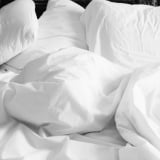lundi 28 mai 2018
How Waking Up Early in the Morning to Exercise Could Actually Be Counterproductive

Better sleep habits rarely come to mind when we start drafting our goals for the new year, but by depriving ourselves of sufficient shuteye, we're hurting our chances of success in other areas - especially when it comes to weight loss and exercise. To better understand how lack of sleep affects our health, we spoke with Terry Cralle, RN, a registered nurse and certified clinical sleep educator at The Better Sleep Council.
"We have to rethink sleep and look at it as the foundation of health and not just one of the three pillars," Cralle told POPSUGAR. "So instead of looking at sleep, diet, and exercise sort of on equal footing, we're now saying that without that basic foundation of sleep, dieting and maintaining a healthy weight and getting the physical activity that we need is really an uphill battle now we know the science."
"We have to rethink sleep and look at it as the foundation of health and not just one of the three pillars."
Many of us don't make that obvious connection. Instead, we see sleep as a means to an end or even as a burden, and it's this kind of thinking that makes us put it at the bottom of our priorities. But if you put sleep first, everything else will fall into place much easier. Cralle continued to debunk the notion that weight-loss success is solely dependent on the person's determination.
"We always look at diet like, 'It's willpower, or character, or motivation.' But no, it's science and it's our hormones," she said.
According to Cralle, lack of sleep causes hormonal disruptions, putting our ghrelin (the hunger hormone) and leptin (the fat hormone) out of whack. And when you try to stay awake during the day with insufficient sleep, your appetite is typically larger and you're likely to crave unhealthy food choices to keep you up. On top of that, you won't have the physical energy to work out.
"There's a nice bidirectional relationship between sleep and exercise," Cralle told us. "If you get sufficient sleep, you're more likely to exercise and you'll be a little more coordinated. But also, when you exercise, you're going to get better quality of sleep."
On days that you wake up earlier for your workouts, plan to head to bed sooner the night before in order to get in your seven to nine hours. Cutting sleep in order to hit the gym at 5 o'clock in the morning could be counterproductive to your fitness goals because you're still going to have that aforementioned hormone disruption. Cralle said that not only will your metabolism be affected throughout the day, but you'll also have higher inflammation in the body. And if your excuse is that you don't run on a whole lot of sleep . . . you may want to reevaluate. According to Cralle, less than three percent of the population are "true short sleepers" - the rest of us require that eight-hour range.
If you have trouble falling asleep at night, she suggested getting outside in the morning before starting your day (whether for a workout or a quick walk), cutting off caffeine by lunchtime, and setting a media curfew for yourself. Giving yourself a wind-down period each night without your devices will better help your mind transition into slumber. Cralle also recommended optimizing your sleep environment by keeping your bedroom as dark as possible at night, investing in a quality mattress, and turning your bedroom into a soothing space.
"I think too many of us put our exercise equipment in the bedroom," she said. "We put our unfolded laundry in the bedroom. We keep our bills stacked. I really believe in keeping all of those out of the bedroom completely and hyperfocusing on making the bedroom a sleep sanctuary."
And it's not just our health that will benefit from getting enough sleep. We'll be able to learn quicker, be more productive, notice improved mood, have better relationships, and more. By shifting to view our sleep as a basic necessity rather than a luxury, we'll likely become aware of differences in a variety of aspects in our lives.
"The quality of our waking hours is so much better when we're well-rested," Cralle said. "[Sleeping] is not a character issue; it's not a work-ethic issue - it's a biological issue, so treat it as such."










0 comments:
Enregistrer un commentaire